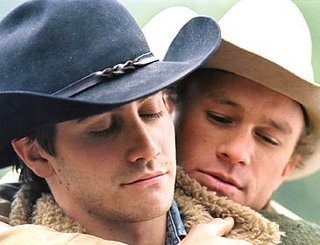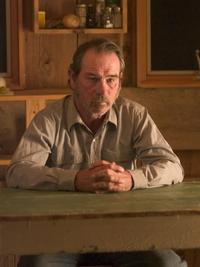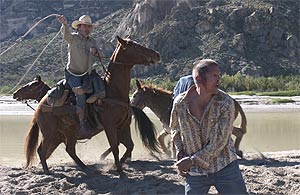 Brokeback Mountain (2005)
Brokeback Mountain (2005)
Director: Ang Lee
The Three Burials of Melquiades Estrada (2005)
Director: Tommy Lee Jones
By Roderick Heath The Modern Western has racked up enough films to be considered a defined and important genre. There have always been Westerns set in contemporary times, such as George Stevens’ Giant (1956), but this genre truly arrived—with its themes of man against society, of nature and humanity intermingling or failing to, of deromanticising a mythic scene—in the early ‘60s, with a small cannonade of pictures. These films included John Huston and Arthur Miller’s The Misfits, David Miller and Dalton Trumbo’s Lonely Are The Brave, and Martin Ritt’s Hud, based not too coincidentally on Brokeback Mountain scriptwriter Larry McMurtry’s novel Horseman, Pass By. The Modern Western is a dusty, disillusioned genre about men and, occasionally, women, who survive on the myths of the past and who often would make excellent heroes for those tales, but find themselves eternally alienated and often destroyed by the tawdriness of modern life. There is no longer the sheer nobility and almost religious awe that attended the commencement of the cattle drive in Red River in the lives of men like Jack Twist and Ennis Del Mar. Today they’re spotty, hopeless young men stuck with the stink of sheep-shit and toxoplasmosis, hardly able to scrape together a living unless they get lucky enough to marry the boss’ daughter. In truth, of course, that was what life was like for the pioneer cowboys, too, but that’s neither here nor there, when John Wayne is more potent a force than any real westerner.
The Modern Western has racked up enough films to be considered a defined and important genre. There have always been Westerns set in contemporary times, such as George Stevens’ Giant (1956), but this genre truly arrived—with its themes of man against society, of nature and humanity intermingling or failing to, of deromanticising a mythic scene—in the early ‘60s, with a small cannonade of pictures. These films included John Huston and Arthur Miller’s The Misfits, David Miller and Dalton Trumbo’s Lonely Are The Brave, and Martin Ritt’s Hud, based not too coincidentally on Brokeback Mountain scriptwriter Larry McMurtry’s novel Horseman, Pass By. The Modern Western is a dusty, disillusioned genre about men and, occasionally, women, who survive on the myths of the past and who often would make excellent heroes for those tales, but find themselves eternally alienated and often destroyed by the tawdriness of modern life. There is no longer the sheer nobility and almost religious awe that attended the commencement of the cattle drive in Red River in the lives of men like Jack Twist and Ennis Del Mar. Today they’re spotty, hopeless young men stuck with the stink of sheep-shit and toxoplasmosis, hardly able to scrape together a living unless they get lucky enough to marry the boss’ daughter. In truth, of course, that was what life was like for the pioneer cowboys, too, but that’s neither here nor there, when John Wayne is more potent a force than any real westerner.
Brokeback Mountain and The Three Burials of Melquiades Estrada are the two latest examples of the form, the appeal of which includes the inordinate amount of grit allowed in paying attention to the lives of working-class people while giving passing nods to the gods of cinema legend. Both films are driven by an intense male bond—in one case, a bond that has bloomed into a proper love affair—and observe the moral and emotional consequences of that bond. Another theme of the Modern Western, inevitably, is culture shift. In Modern Westerns, the heroes are tugged at and tempted by the pull of changing cultural winds even whilst they try their best to preserve themselves in an old cultural skin. Both films essentially exist within the same environment, where nature is predominant rather than repressed, where civilization has petered out in shabbily built buildings through which the wind whistles, and society is almost sparse enough for people to get away with living by their own rules. Almost.
As in another recent Modern Western, Billy Bob Thornton’s underrated All The Pretty Horses, Three Burials is about the divide between the United States and Mexico, of the temptation of outsider gringos to find their identities in the romantic poverty of Mexico. Tommy Lee Jones’ aging cowboy Pete Perkins takes it upon himself, like a true western hero, to fulfill an unanswered plea for justice. The method he uses is not a varmint shooting, but a primal process of penitence inflicted on the callow, foolish, violent border guard Mike Norton (Barry Pepper), who has killed accidentally Pete’s amigo, the illegal immigrant baquero Melquiades Estrada (Julio Cadillo).
These characters inhabit a sterile, impermanent Texas town where Mike and his wife Lou Ann (January Jones) have moved from Cleveland and where they were a popular, pretty couple. In the film’s first half, the various characters are explored in layered, time-hopping style. Without the distracting buzz of suburban life, Mike’s emotional vacuity and gross sexuality are thrown into high contrast. Mike takes out his frustration on the illegals he captures. Lou Ann, increasingly alienated and excruciatingly bored, is pulled into friendship with waitress Rachel (Melissa Leo), who lives a cheerfully your-cheatin’-heart lifestyle, having affairs with Pete and local sheriff Belmont (Dwight Yoakam) under the nose of her diner-owner husband. Lou Ann ends up spending mot of her time with Melquiades, and it is a pure coincidence that Pete guns down Melquiades whilst on patrol. The first “burial”’ is the shallow grave Pete gives Melquiades on a mountain. The second is the one the authorities give him when his body is disinterred by coyotes. With only rumours as to what happened spread by the border guards, and Belmont’s insistence that Melquiades was “only a wetback,” Pete abandons his reticence in favour of kidnapping Mike, forcing him to dig up Melquiades’ corpse, and then proceeding, with the border guards in hot pursuit (and Belmont’s comic disinterest), to cross the border to give Melquiades—and maybe Mike—a proper burial.
The first “burial”’ is the shallow grave Pete gives Melquiades on a mountain. The second is the one the authorities give him when his body is disinterred by coyotes. With only rumours as to what happened spread by the border guards, and Belmont’s insistence that Melquiades was “only a wetback,” Pete abandons his reticence in favour of kidnapping Mike, forcing him to dig up Melquiades’ corpse, and then proceeding, with the border guards in hot pursuit (and Belmont’s comic disinterest), to cross the border to give Melquiades—and maybe Mike—a proper burial.
Ennis Del Mar (Heath Ledger) is as classic a westerner as Pete Perkins. Tall, rangy, stiff-mouthed, painfully reserved, the redeeming aspects of his life are his one true love, Jack Twist (Jake Gyllenhall), and, much later, his daughter Alma Jr. (Kate Mara). In between are an eternity of pain caused by confused and gut-wrenching relationships with the one man and several women in his life. Ennis, orphaned in his adolescence, finds his identity crystallised during the months he and fellow teenaged ranch-hand Jack tended sheep on the eponymous slab of wind-washed granite. When both are prematurely exiled from the existence that seems redolent of a Greek mythic idyll, they accept their surface identities within the strict machismo order of modern Midwest America. Jack tries to live up to the macho reputation of his bullrider father, then marries dashing horse girl Lureen Newsome (Anne Hathaway) and does his best to wriggle his way up the social pole. Ennis marries Alma de Beers (Michelle Williams) and has kids by her, but can never give up either his desire for the simple freedom of range work or for the adolescent warmth of his love for Jack. Their snatched interludes together on fishing trips, tolerated to a certain extent by their wives, offer fleeting and ultimately dissatisfying tranquility. Both men are transfigured by their sexuality, but where for Ennis it is a vital emotion he seeks, for Jack it’s both more complex and also more typical; carefully compartmentalising, he sleeps with Mexican male hookers and keeps on the lookout for another partner who will adapt to his part-time vision of love. Ennis lives in justified fear of frontier morality, which eventually claims Jack.
Jack tries to live up to the macho reputation of his bullrider father, then marries dashing horse girl Lureen Newsome (Anne Hathaway) and does his best to wriggle his way up the social pole. Ennis marries Alma de Beers (Michelle Williams) and has kids by her, but can never give up either his desire for the simple freedom of range work or for the adolescent warmth of his love for Jack. Their snatched interludes together on fishing trips, tolerated to a certain extent by their wives, offer fleeting and ultimately dissatisfying tranquility. Both men are transfigured by their sexuality, but where for Ennis it is a vital emotion he seeks, for Jack it’s both more complex and also more typical; carefully compartmentalising, he sleeps with Mexican male hookers and keeps on the lookout for another partner who will adapt to his part-time vision of love. Ennis lives in justified fear of frontier morality, which eventually claims Jack.
Both films are remarkably rich tapestries that extend well beyond the specifics of their plot to take in an almost epic, yet expressively minimalist vision of whole cultures in a state of flux, and the people within them in a state of crisis. Although Pete and Melquiades are not homosexual—though it’s easy to imagine Pete as Ennis, 20 years after the end of Brokeback—their bond, as well as Jack and Ennis’, demand almost mystical commitment to notions beyond the visible, or even factual. For Ennis, it is to accept permanent emotional exile: our last vision of him, a reverse of the end of The Searchers, is gazing out on an eternal plain whilst living with dreams and memories in his shabby trailer. For Pete, it is to reject his country, his livelihood, even his sanity, to give Melquiades a true resting place, and extract from a man with no terms of reference beyond bad daytime soaps and suburban plasticity a true contrition.
It’s ironic, perhaps, that Brokeback Mountain, concentrating as it does on a gay romance, offers its most biting and memorable moments in observing the men’s heterosexual lives—the kitchen confrontation where Alma, having left Ennis, lets slip her simmering loathing of him and Jack sets Ennis off like Krakatoa, is one of the most convincing moments of marital spite ever filmed. Similarly, when Ennis spurns vibrant barmaid Cassie (Linda Cardellini) and apologises, “Sorry, I can’t have been too much fun,” she responds in anguish, “Dammit, Ennis, girls don’t fall in love with fun,” I suspect a lot more men than the bisexual cowboys of this world might recognise themselves. The film follows Annie Proulx’s majestic novella very closely, ironically weakening when it adds some potentially nifty ideas of its own, especially Lureen. Lureen’s status as a gender-crosser in her own right, a champion rodeo rider who boldly seduces and screws Jack, demanded more depth and time and strikes sparks off the film’s later portrait of her as an icy homestead princess. The Three Burials of Melquiades Estrada is a messier, less compressed tale, and overdoes its early portrayal of Mike Norton’s baseness, but then Three Burials has an edge of wryly surreal comedy and deliberate morality tale at its heart, not the lightly poetic realism and heart-dulling tragedy of Brokeback Mountain.
Ang Lee is a great filmmaker, but has yet to make a genuinely great film. His work on Brokeback is as meticulous and measured as always, almost too much so. It is often so over-posed in its desolate beauty as to look like the world’s first animated Andrew Wyeth painting, and his feeling for the West is never quite convincingly raw. Since the warm inclusiveness of his early films, a frost has gilded Lee’s heart, and he finally seems to mistake emotional stinginess for detachment. This attitude accounts for my lingering dissatisfaction with Crouching Tiger, Hidden Dragon, Ride With The Devil, The Ice Storm, and his work on Brokeback Mountain, which is finally a triumph more for the actors and screenwriters (McMurtry and Diana Ossana), than of Lee’s Oscar-winning turn.
In comparison, Tommy Lee Jones’ work on Three Burials is much less refined and skilled, particularly some clumsy scene interchanges where music starts blaring without reason and static camera set-ups. Yet Jones knows his subject more truly, and at his best, he captures with almost surreal intensity his locale and characters, particularly when he gets to the Mexican side of the border, and Pete lounges drunkenly in a cantina that’s ancient but with modern appliances. Guillermo Arriaga’s screenplay is as humane and fine-threaded as his work for Alejandro Gonzalez Inarritu, and retains two of his singular qualities: his love of moral fable and his tendency to go on too long.
A part of me wanted to see—unlikely as it was—Sam Peckinpah make Brokeback Mountain, and Three Burials gives hints of what that might have looked like. For Peckinpah, that blood and dust and hot leather would have reeked with urgency, whilst Brokeback smells only of far-off snow. Brokeback Mountain is still a remarkably haunting and intense experience. Three Burials is a less fine but more pleasurable experience, its moments of urgent humanity and its jolts of wry humour sit happily in the memory. Both films are spotted with great performances up front and in the background from Pepper, Leo, and Levon Helm in Three Burials, and from Ledger, down to Williams, Hathaway, Cardellini, even a small shot of cheer from scene-stealer Anna Faris (whose dingbat starlet was one of Lost In Translation’s memorable elements), in Brokeback. Beyond this, Three Burials confirms the beauty of human beings, where Brokeback, for all the pseudo-political arguments the mass-media and commentators tried to extrapolate from its tale, actually states a thesis that living is agony, no matter your caste and character. l


0 Comments:
Post a Comment
<< Home